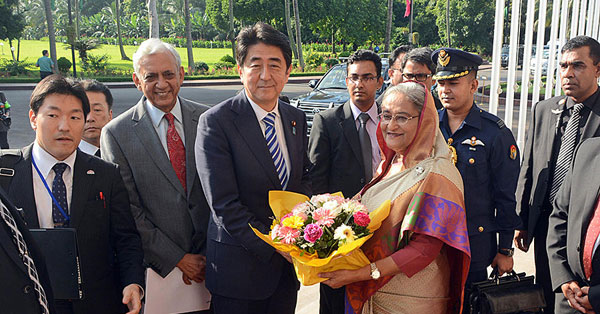Published in Monitor Global Outlook on Monday, 8 September 2014.
Followup: Tokyo firms up investment plans in Dhaka
ON-THE-GROUND
The infrastructure and investment promotion that Japan is pursuing [in Bangladesh] is quite unique. – Khondaker Golam Moazzem, Centre for Policy Dialogue
FULL BRIEFING

Photo: S.I. Kalol/AP/Monitor Global Outlook
Japanese Prime Minister Shinzo Abe visited Dhaka on Sept. 6 with an entourage of 22 business leaders, as Bangladesh moved to back Tokyo’s ambitions at the UN.
Expanded business and aid ties between Tokyo and Dhaka in steel manufacturing, health care, and beyond are firming up rapidly, as Bangladesh moves to support Japan’s geopolitical influence and ambitions at the United Nations.
Prime Minister Sheikh Hasina confirmed that Bangladesh would withdraw its bid for a seat on the UN Security Council and instead back Japan’s bid during Mr. Abe’s September visit. Monitor Global Outlook reported in August that Bangladesh would likely throw its UN support behind Japan in return for greater economic aid and investment. [Please see: MGO: Aug 19, 2014: Tokyo seeks UN support from Dhaka in return for aid]
The growing ties underscore Japan’s move to counter Chinese political and economic influence in South and Southeast Asia, as Tokyo also contemplates a greater security role in Asia. Tokyo has promised Dhaka $6 billion in development assistance over a period of four to five years, targeted at improving the investment environment, economic infrastructure, and economic zones as well as ensuring energy stability and connectivity. Japan is also expected to win the rights to operate a new special economic zone in Chittagong.
More broadly, Dhaka wants Tokyo to consider Bangladesh as low-cost alternative to China for Japanese businesses, under Japan’s “China plus” strategy.
“The infrastructure and investment promotion that Japan is pursuing [in Bangladesh] is quite unique,” said Khondaker Golam Moazzem, research director of Dhaka-based think tank Centre for Policy Dialogue tells Monitor Global Outlook.
Bangladesh’s exports to Japan increased by 14.9 percent last year to $862 million. Japanese foreign direct investment in Bangladesh has tripled from $31.36 million in fiscal year 2012 to $99.04 million in FY2013.
Japan’s Ship Healthcare Holding Inc tied up a deal with Bangladesh’s Aichi Group in July, taking a 60 percent stake in a joint venture plan to set up a $64 million, 500-bed hospital. Ship Healthcare CEO Kunihisha Furukawa, who accompanied Mr. Abe on his Dhaka visit this week, said at a business forum in Dhaka that he plans to initially invest $19 million in setting up the hospital.
Japan’s largest steelmaker, Nippon Steel & Sumitomo Metal Corp. is set to launch a steel manufacturing plant in Chittagong this month, which will supply local companies, particularly garment factories, that are increasingly using pre-fabricated steel buildings. Nippon has also entered into a 50 percent partnership with the locally-based McDonald Steel Building Products Limited.
Japanese business leaders, however, also want Dhaka to relax investment rules; they are pushing for a less stringent lab,or law, the opportunity to recruit foreign professionals, a corporate tax reduction, and the establishment of a single-window facility for quicker investment approval.

